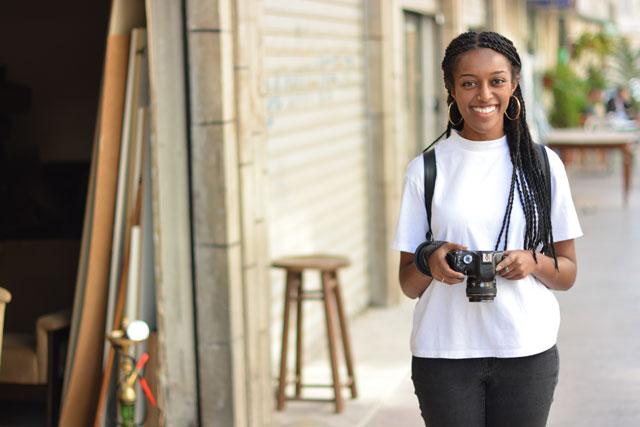You are here
Photographer turns camera on herself to tackle obesity
By AFP - Dec 17,2014 - Last updated at Dec 17,2014
PARIS — In bed asleep, eating, in her underwear or even displaying her scars after weight loss surgery, photographer Jen Davis has always been as comfortable in front of the camera as she is behind it.
But when Davis, 36, set out on a “journey of self discovery” to explore her own weight problem through a series of self-portraits, she discovered a side to herself she didn’t know existed.
Just published in a book titled “11 Years”, Davis came up with the idea in 2002 when she was a student.
“I was at the beach on a spring break vacation. I guess I hadn’t been in a bathing suit for a while and there was this heightened sense of being very uncomfortable,” she told AFP in an interview in Paris.
“That was the starting point — to look at my anxieties,” she said.
The resulting photograph, titled “Pressure Point”, showed her sitting awkwardly on the beach next to a svelte and toned friend in a bikini.
Davis began photographing herself in everyday situations, initially choosing images that were “safe and easy” such as hanging out her washing or having a meal with a friend.
“I wasn’t thinking about an audience and I knew I didn’t have to show them to anyone, so it didn’t inhibit me from taking pictures that were hard to look at,” she said.
But as the project went on she started to challenge herself to reveal more flesh with pictures of her trying to do up the waistband of her trousers or showing a close-up of her chin.
“I realised that I was looking at this private side of myself that I didn’t know, looking underneath this shield of how I projected myself to the world,” she said.
Journey of self discovery
Over the following years, Davis, a Brooklyn-based photographer who specialises in portraits, amassed hundreds of photographs of herself .
But nearly a decade after beginning her photographic project, she realised that despite the years of self-discovery, her weight remained unchanged.
In 2011, she decided to undergo weight loss surgery by having a gastric band fitted.
As the kilos fell off — 52 kilogrammes within a year — Davis came to realise just how much the excess kilos had dominated her life.
“It was all about my body and discomfort and dealing with pressures that I felt, like feeling scrutinised by people’s eyes,” she said.
“I felt judged in society. On the subway I felt that people were starring at me or making fun of me,” she said.
“Even if it was not in a verbal way, it was in a look, people staring or rolling their eyes.”
The most upsetting experiences came when people tried to temper comments about her weight with what they saw as kindness.
“People would say ‘oh you have such a pretty face but your body needs to change’. Or ‘you’re so overweight but you’re pretty so if you lose weight you’ll be happy or have a boyfriend’,” she said.
“That happened at a wedding. A woman said that to me and I burst into tears.”
‘People were staring’
As the number of obese people increases worldwide — creating looming public health crises in some countries — Davis said the issue had become a minefield.
The most vicious prejudice was now expressed under cover of anonymity in online forums and comment boxes, she added.
People in the public eye, meanwhile, such as the governor of New Jersey, Chris Christie, who opted for gastric bypass surgery without publicly announcing their decision, risked incurring the wrath of the public.
“All of a sudden he was losing weight and the public was so angry that he didn’t come forward with this,” she said.
Having concluded that her own problem was caused by a psychological need to comfort eat, Davis knows she will have to work hard for rest of her life to maintain her new weight.
But she is grateful for the surgery without which she believes she could never have achieved it.
“Some people are ‘fat positive’. But I could never see myself as beautiful or subscribe to that,” she said.
Related Articles
Bariatric surgery has become the medical profession’s go-to solution for meaningful weight loss, and new research shows why: It saves lives.
AMMAN — A month ago, Semhal Tsegaye, an Amman-based amateur photojournalist, was scrolling through Facebook when she learned about Women Pho
AMMAN — When she started working with bees and cattle around 15 years ago, Sameera Mouawad said “she knew nothing about bees or how they wor



















